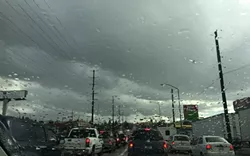If you spend your weekdays checking the weather on your phone, hoping that it will show two bright yellow sun icons next to Saturday and Sunday, then you've likely been tricked into the same misguided optimism this year as I have.
Sure, on Monday, Spokane's forecast for the weekend says it should be nice, once we get through the rain and clouds of the weekdays. But then Friday comes, and it turns out Saturday's forecast is mostly cloudy, that it's probably going to rain a little bit, and that the day when you can enjoy the warm spring sun will have to wait.
Why does it seem like this keeps happening this year more than normal? As National Weather Service meteorologist Steven Van Horn explains, this spring's weather has been difficult to predict for a couple reasons — but mostly because of the rain. And if you think it has been wetter and cloudier than normal, then you're right.
The normal amount of precipitation in the period from March 1 until today is 3.8 inches, he says. But this year, Spokane has recorded 6.72 inches. That's the highest amount in the same period in the last decade, and it's near the highest ever recorded in that period — 7.54 inches.
The Inland Northwest has seen more low-pressure weather systems this year than in the past. That brings more rain, and it also makes it harder to give accurate forecasts, he says. It's easier to forecast when there are high pressure patterns, but it's harder to model low-pressure systems.
"That's why forecasts will change or be modified when we get closer to the event," he says.
He notes that meteorologists have significantly less confidence in forecasts seven days out than a couple days away from the weekend, anyway. But it's not uncommon for an unforeseen tropical disturbance in the Pacific Ocean to throw off all the models a day or two before the weekend, he says.
Looking out toward late spring and summer, Van Horn says the outlook is even less certain. Last year, they had a pretty good idea that it would be a dry summer. This year? Everything is in play. The models show "equal chances" when it comes to the amount of precipitation this summer. That means "we have the same chance of below normal precipitation, of around normal precipitation, and above normal precipitation."
"The predictability is not as good," Van Horn says.
So not only is the weather this year hard to predict in the short term, but there aren't too many answers long-term, either. But keep checking the weather app if you want.

